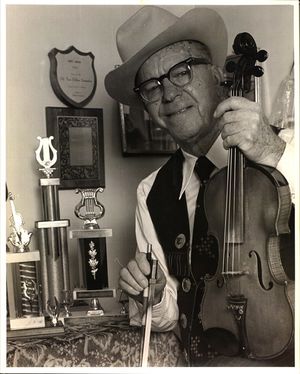Annotation:Choctaw Bill: Difference between revisions
m (Text replace - "[[{{BASEPAGENAME}}|Tune properties and standard notation]]" to "'''Back to [[{{BASEPAGENAME}}]]'''") |
No edit summary |
||
| (12 intermediate revisions by 2 users not shown) | |||
| Line 1: | Line 1: | ||
{{featured}} | |||
{{TuneAnnotation | |||
|f_tune_annotation_title=https://tunearch.org/wiki/Annotation:Choctaw_Bill > | |||
'''CHOCTAW BILL'''. | |f_annotation=[[File:Douglas5.jpg|thumb|Bob Douglas]]'''CHOCTAW BILL'''. American, Reel (cut time). C Major (Phillips): A Major (Canote). Standard or AEac# tuning (fiddle). AABB (Canote): AA'BB (Phillips). "Choctaw Bill" was recorded by both Bob Douglas and Blaine Smith, of east Tennessee. There were a few 'Choctaw Bill's' in the Louisiana/Texas region, including William Robinson (1809–1898), an early Texas pioneer and an ordained Baptist minister who organized or served as pastor to some 20 churches, and William Williams (1776-c. 1830) of Louisiana. Robinson was nicknamed 'Choctaw Bill' because a band of Choctaw Indians once complained about his long sermons, which could go on for hours. The melody is sourced to east Tennessee fiddlers Blaine Smith and Bob Douglas, and seems to be unique to their repertoire. Smith was recorded in the field in 1977 but proved to be a reticent and un-talkative man of whom it rumor had (not accurately) that he had served time in the Brushy Mountain Maximum Security State Penitentiary for murdering a man who stumbled across his moonshine operation. | ||
|f_source_for_notated_version=[[biography:Bob Douglas]] (1900-2001, Rhea County, Tennessee) [Phillips]. | |||
|f_printed_sources=Phillips ('''Traditional American Fiddle Tunes, vol. 1'''), 1994; p. 50. | |||
|f_recorded_sources= | |||
|f_see_also_listing=Hear Bob Douglas's version at Slippery Hill [https://www.slippery-hill.com/recording/choctaw-bill-0]<br> | |||
Hear the Canote Brothers' version at Slippery Hill [https://www.slippery-hill.com/recording/choctaw-bill]<br> | |||
}} | |||
------------- | |||
' | |||
Latest revision as of 16:37, 18 May 2020
X:1 T:Choctaw Bill N:From the playing of Bob Douglas & Georgia Boy Brown (Tenn.) M:C| L:1/8 R:Country Rag D:https://www.slippery-hill.com/recording/choctaw-bill-0 Z:Transcribed by Andrew Kuntz K:C [de]-|[e3e3] +slide+[ee]- [ee]dc2|A4G4|c2de- ega2|g6 [d2e2]-| [e3e3] +slide+[ee]- [ee]dc2|A4G4|A2Bc- ccd2|c6:| zD|-E2 EF EDCE|F2FFF2D2|-D2d2 BAGB|cBcd edcA| E2 EF EDCE|F2FFF2D2|-D2d2 BAGB|c2 cc c2cG| EDEF EDCE|F2 FF F2FF|FAdc BAGG|c2cc _edcA| E2 EF EDCE|F2FFF2d2|-d2 d2 BAGB|c2 cc c2||


